Mostly of the bathroom.
In the
initial post, I had a few pictures up of the "before", along with the early stages of demolition.
Over the intervening weekend we took a side trip into the kitchen to fix a leaking draing, and in the process found out the vent on that drain line had been rather kludged:
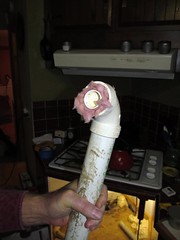
That's a shining example of "what not to do" or "redneck engineering". It makes the drains slow, and when pressures change just right, it vents sewer gas back out. In our case, it was venting it into a wall space which made our bedroom occasionally smell bad. We put the proper vent in (called a "cheater vent", and meets code if there is a real vent elsewhere) and it has (A) stopped the stench and (B) the kitchen sink drains MUCH faster.
While Dad and I were fixing that drain, MrsZ was getting the bathroom sanded and primed.
So here goes the dump, with commentary along the way.
After the first post, this is where things were:
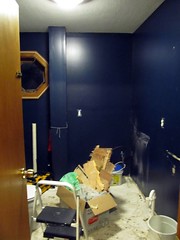
The vanity and washer/dryer were out, the toilet had been removed from its base, and the tile and underlayment were all stripped up. No pictures of the sanding/priming, as I was either at work, or occupied with the drain repair.
Monday this week, we started (and finished) painting:
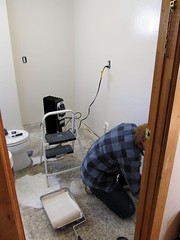
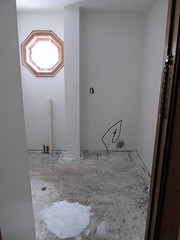
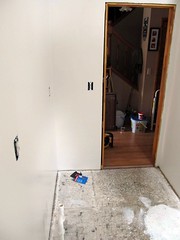
Tuesday, I sanded the subfloor, wiped it with bleach solution, and let it dry. Then I started cutting and putting down underlayment. This was an all-day project as I measured, remeasured, and cut around the stubs for plumbing. I did the best I could, but it wasn't perfect. Fortunately, the ugliest ones will be well-hidden by the vanity.
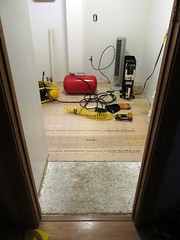
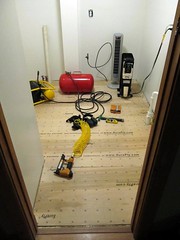
(Handy tip: an 8oz margarine tub seals a toilet stub just perfectly!)
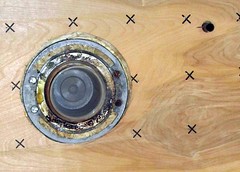
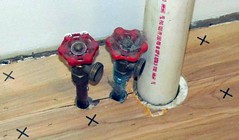
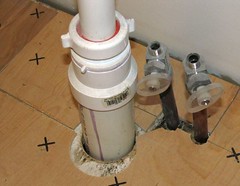
That was Tuesday. I was rapidly running out of energy and patience with this project...

Wednesday morning I slept in a little bit, then got ready for tiling. Vinyl tile (and sheet) has a tendency to show ANY imperfections in the underlayment: gaps larger than 1/16", any bumps, etc. So I spackled the one large gap (my straight cut wasn't quite), swept several times, vacuumed carefully, swept again, vacuumed again, and waited for the spackle to dry.
I chose to use tile adhesive in addition to the self-adhesive tiles*, so that required a fair bit more effort. First I found and marked the center of the room, then determined what
pattern I wanted to lay. MrsZ had strongly pushed for a diamond pattern, but looking at it I didn't care for it. I tried jack-on-jack and that looked far too institutional, so I tried running bond. Perfect!
I spread adhesive over the back half of the room and let it set for its needed "open time" (time to let the glue tack up and evaporate some of the solvents), then started laying tile at the center of the floor. I laid all the field tiles first, then the edge pieces that needed trimming, then spread the front half of the room and started cutting the tiles for the stubs in the back half.
It's labor-intensive work, but not overly complicated. Vinyl tiles score easily with a utility knife, and using the spacers makes the gaps consistent. Those spacers work a trick, but they hurt about as much as Legos to step on with bare feet.
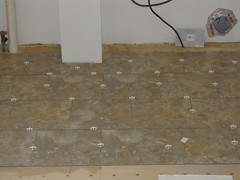
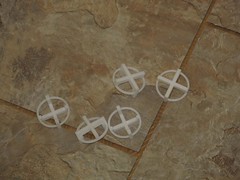
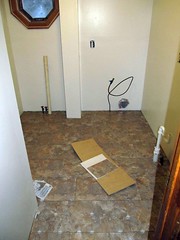
We had briefly debated whether we wanted to gap-and-grout the tiles, or lay them on tight seams. It meant more effort, but I'm very glad we went with the grout. Once a tile was down flat, it wasn't coming back up, nor was it shifting side-to-side more than a tiny bit. Even being careful with the spacers, there are a few spots where my 1/8" spacing widened out a tiny bit, and the grout hides that admirably.
Wednesday evening the adhesive cured, and Thursday morning I got what I needed to do grout. Just before I dug in, the delivery driver called to tell me he was half an hour away with the washer, so I sat back and read a book instead. The washer was delivered (to the middle of the dining room), and I started with the grout:
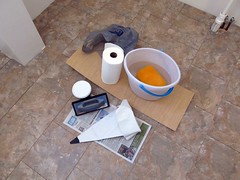
One quart of pre-mixed grout, one bucket of clean water, one large sponge, one roll paper towels, one grout float, one grout tube, a trash bag, and some paper to catch the mess. The tube is optional - it's essentially an overgrown cake decorator's tube - but it makes laying grout right in the seams MUCH easier.
Work on 4-6 square feet at a time, which will be about 10-12 linear feet. Use a damp paper towel and wipe down the seams and a couple inches on each side. Squeeze grout into about 2/3 of the space you're working on, then use the float at a 45-degree angle (from the floor) to push the grout in and along.
As you finish a section, use the sponge - just barely damp - to lightly buff the area you're working. You're trying to smooth the joints and loosen up the excess. Use paper towels to wipe off the tiles. Whenever the bucket of water is cloudy, change it for clean water. Expect to do this after *every* patch of tile. Just keep chugging along - it goes fairly quickly.
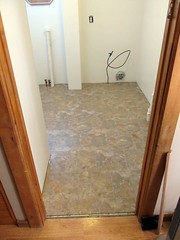
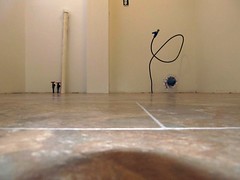
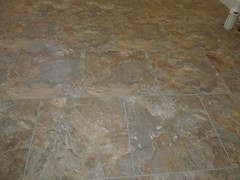
With that done ... put a fan in the door and walk away. Don't walk on it for several hours while the grout dries and sets. When it is dry to the touch (four hours in my case), use a soft rag (like a car polishing rag, old diaper, old flannel shirt, whatever) to gently buff the whole floor. There's going to be a light grit on the whole thing until you do this. DO NOT MOP IT. Just lightly buff it by hand.
The next day or two days later, seal your grout - this will keep it from growing mildew or discoloring over time.
When I was done with all that last night, I looked at our pile of laundry and decided it would be OK to put the appliances back in... So I did.
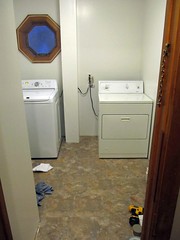
New washer, old dryer. I'll be working on baseboard trim, wall plates, and getting the vanity and toilet back in over the coming week. We have clean clothes in the meantime. :-)
* - Whoever did the upstairs bathroom used self-adhesive tiles without glue or grout, and they shifted over time. This is the end result:

See why glue and grout makes sense?




























